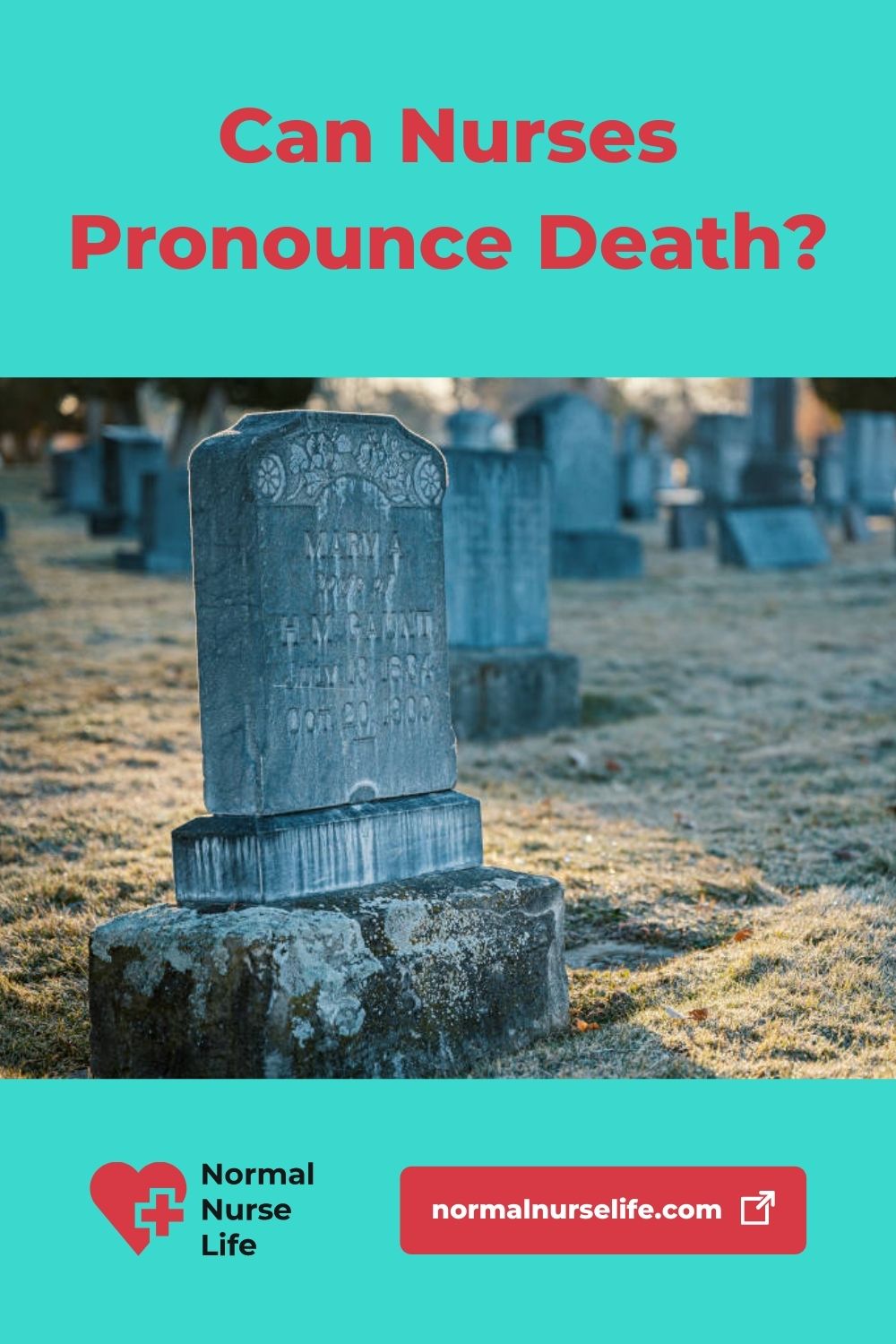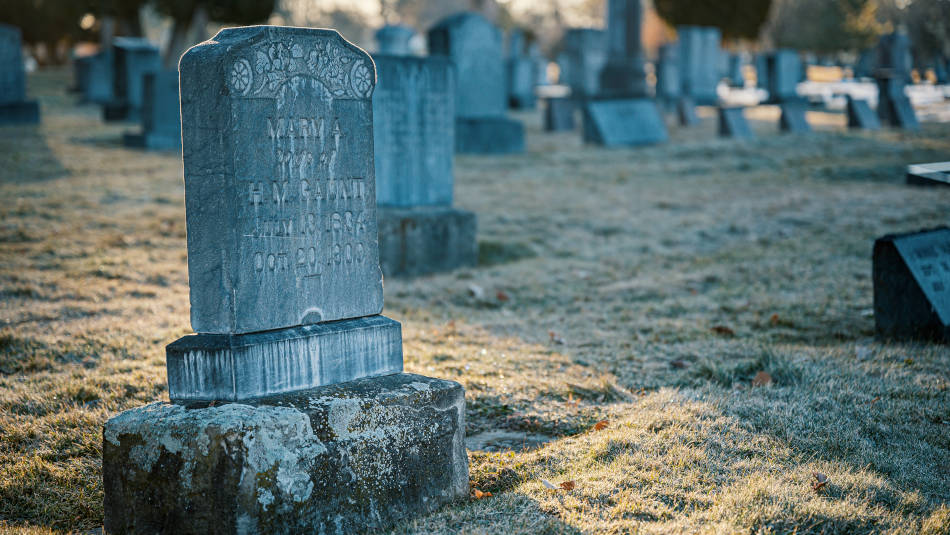For the most part, nurses aren’t allowed to pronounce death. Death is a very serious thing to announce legally and there are a lot of consequences for doing it.
One also has to know the difference between death and the other states that an individual might be in at the time.
Can nurses pronounce death?
Right now, there are only around 3 states that will allow nurses to pronounce death in all circumstances. Those states are New York, Texas, and Maine.
Generally, these are states that have poor health along with large densities of populations.
Doing this helps the state move faster in all the other things that they would want to do.
A nurse’s assistance is always good for situations like this for when the workload gets to become too much for the hospital.
Nurses also have to write down the reasons why they think someone passed away which is also important for research in the future.
Pin me on Pinterest!

Table of Contents
Can an RN pronounce death?
RNs can pronounce death in New York, Texas and Main, but they are more than likely going to get more options in the future.
Nurses are just as educated as doctors when it comes to the issue of death.
See also: Do Nurses Have to Do Continuing Education?
In many cases, they are a lot closer to their patient than an actual doctor is because they tend to spend more time with them.
Generally, this is going to make the nurse a lot better at giving the proper reason as to why someone passed away.
As a professional, who only gets to see a patient at a vulnerable part of their life, it can be hard to choose the correct option of why someone passed away.
However, when the person who has known the patient longer does it, we can generally get a more accurate answer.
It’s a very important thing a person can decide because it can even overwrite a marriage license.
Not every death is the same and some are a lot more severe than others.
This is why if a nurse is going to pronounce death, they need to think about the ramifications of doing so.
See also: How to Become a Hospice Nurse
How responsible nurses are with this power will decide if more states get to do it.
See also: Responsibility of a Nurse
Can nurse practitioners pronounce death?
Nurse practitioners can currently pronounce death in 26 states. There is an official waiting period in case someone is just feeling unconscious or is going through a coma.
The 24 hour waiting period gives nurses and the other working staff to prepare for the deceased individual.
This privilege makes sense because a lot of people are going to be dying in the states where this is permitted.
This helps with the workload for those people who are working as doctors.
Even then, it’s hard to imagine the gravity of the situation that’s going on until they actually do it.
For someone to be dead legally, a licensed medical practitioner has to sign a death certificate 24 hours after they pass away.
This is why there are often rumors of someone passing away, yet you never actually hear about it until a few days later.
If death becomes more rampant in other states, legislators may sign laws that allow nurses in other states to officially pronounce death.
There wouldn’t be a reason to do this if the rate of death was on the decline.
Right now, nurses in other states do want the ability to do this because they feel they have the experience to do so.
See also: Can Nurses Accept Tips?
Can nurses pronounce death in all states?
Nurses in only around 20 states can pronounce death in any situation.
A bullet wound is much easier to pronounce death on than a patient getting some allergic reaction from a drug.
See also: Do Nurses Get Drug Tested?
A big part of this is also seeing how the patient may respond to other kinds of situations differently.
For example, a lot of us eat peanut butter and other kinds of protein but then there’s an entire group of people who are allergic and in many cases could have fatal reactions.
People in different kinds of states such as California or New York have higher rates of death because those states are more dangerous and polluted.
This is something nurses need to keep in mind when signing a death certificate.
They also have to think about the lifestyle choices an individual makes when dealing with patients like that.
A lot of the time those people take drugs which hurts their hearts.
People in states that don’t have the same kind of drug or pollution problem don’t need to deal with these situations so of course, they’re going to be surprised when it happens.
Now let’s take a look at can nurses pronounce death in Illinois or in California.
See also: Can Nurses Treat Family Members?
Can nurses pronounce death in Illinois?
In the state of Illinois, nurses can pronounce death in some circumstances.
Illinois has become one of the most violent states in the last few decades, so there is more death to deal with than usual.
Nurses need to be able to deal with all the people in fatal conditions, however, there are still a lot of conditions that prevent them from doing so.
Perhaps some of those would be lifted if the state were to get a bit safer for the individual who lives in the state.
Though, being able to pronounce death has helped them in a lot of cases.
It doesn’t take decades of experience as a nurse to pronounce someone as dead when they see someone who’s been hit by a barrage of bullets.
In fact, most of the entire midwest is very deadly and nurses face death on a regular basis in the hospital.
The biggest reason why nurses can pronounce death in Illinois is that doing so is a lot less complicated than being in West Virginia or a Pennsylvania suburb.
Generally, this makes sure that the other staff at the hospital can get other things done when death is pronounced after 24 hours.
Can a nurse pronounce death in California?
California is one of the most liberal states when it comes to the freedom nurses are allowed to get.
The state used to be very dangerous in the late 80s and 90 with people dying from gunshot wounds all the time.
However, now the state has a massive drug problem.
Specifically, people overdose from the use of heroin all the time.
Heroin is very dangerous but a lot simpler for nurses to pronounce death on.
In situations like that, their license lets them pronounce death. It’s a great privilege to be able to do it even in those cases.
Comas often make these situations a lot more difficult to deal with.
There are signs of comas with heartbeat patterns and how the body handles consciousness, but nurses just have to be patient with it.
It’s far worse to pronounce death and have someone wake up than someone who is very dead pronounced dead much later on.
It’s a serious legal decision that a nurse could lose their license for if they aren’t careful enough.
As long as they understand that level of seriousness every time they do this, they can keep pronouncing death.
Conclusion: Can a nurse call time of death?
Nurses can call the time of death when they sign the death certificate, but it’s not always that simple.
Deciding when a patient is dead can be a bit problematic if they don’t know the patients’ medical history that well.
The worst thing a nurse could do is pronounce death when the people just happen to be passed out.
Sometimes, these things just have to be figured out with experience and the nurse needs to see real people before them so they know they’re making the right decision.
Mistakes will happen, but they have to practice to minimize the rate of that happening.
Some countries also allow for the same kind of system but many of them don’t, since they don’t have the problem the U.S. does at the same rates.
There may also be cultural reasons as to why nurses can’t pronounce death as well as the death certificate having different ramifications when it happens.
Generally, there isn’t as much at stake if someone happens to pronounce death for the wrong cause of using the wrong time frame to do so.
Knowing the time of death can help with the cause in numerous different ways.
It can also help law enforcement if there’s an ongoing investigation.
Knowing the time of death narrows down the kinds of possibilities that led to a person’s death.
It’s also the nurse’s responsibility to use their best judgment as to why a person has passed away.
This is very difficult given that you don’t have the person’s entire history in front of you.
As long as the nurses do their best to make sure that there isn’t anything dishonest going on, then their time of death should be accepted.
If it works out, there is the possibility that more states will adopt these privileges for their nurses.
Related articles of ours:
- Why Compassion Is Important in Nursing?
- Can a Registered Nurse Bill for Services?
- Can a Registered Nurse Open a Medical Spa?
- Can Nurse Practitioners Intubate?
- Can Nurse Practitioners Do Surgery?
- Can Nurses Do Ultrasounds?
- Can Nurses Remove Stitches?
I’d appreciate it if you could give this article a star rating. Thank you in advance!
